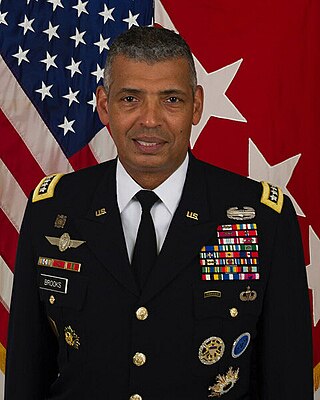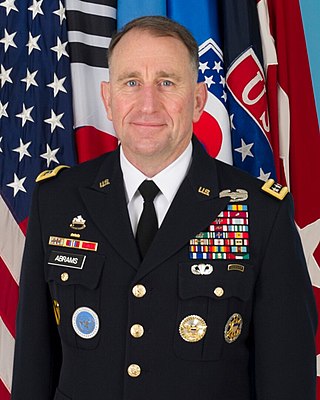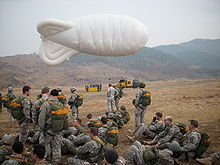
The Republic of Korea Armed Forces, also known as the ROK Armed Forces, are the armed forces of South Korea. The ROK Armed Forces is one of the largest and most powerful standing armed forces in the world with a reported personnel strength of 3,600,000 in 2022.

Vincent Keith Brooks is a retired United States Army general who last commanded United States Forces Korea, United Nations Command, and ROK-U.S. Combined Forces Command. He previously served as the commanding general of United States Army Pacific and prior to that as the commanding general of Third Army. Brooks was the United States Central Command Deputy Director of Operations during the War in Iraq, and frequently briefed the media, which raised his public profile. He also served as the Chief of Army Public Affairs The Pentagon. He was the deputy commander of 1st Cavalry Division in Baghdad during the 2006–2008 "surge" and upon returning to the United States became the commanding general of the same division. He later was commanding general of the 1st Infantry Division. Brooks assumed command in Korea on 30 April 2016, and was succeeded by Robert B. Abrams in November 2018, then retired on 1 January 2019.

The United States Army Special Operations Command (Airborne) (USASOC ( YOO-sə-sok)) is the command charged with overseeing the various special operations forces of the United States Army. Headquartered at Fort Liberty, North Carolina, it is the largest component of the United States Special Operations Command. It is an Army Service Component Command. Its mission is to organize, train, educate, man, equip, fund, administer, mobilize, deploy and sustain Army special operations forces to successfully conduct worldwide special operations.

The United States Forces Korea (USFK) is a sub-unified command of U.S. Indo-Pacific Command (USINDOPACOM). USFK was initially established in 1957, and encompasses U.S. combat-ready fighting forces and components under the ROK/US Combined Forces Command (CFC) – a supreme command for all of the South Korean and U.S. ground, air, sea and special operations component commands. Major USFK elements include U.S. Eighth Army (EUSA), U.S. Air Forces Korea, U.S. Naval Forces Korea (CNFK), U.S. Marine Forces Korea (MARFORK) and U.S. Special Operations Command Korea (SOCKOR).
The 607th Air Intelligence Squadron is located at Osan Air Base, home of the 51st Fighter Wing, roughly 40 miles (64 km) south of Seoul, the capital of the Republic of Korea. The squadron comprises six flights of approximately 180 officer and enlisted personnel. United States military personnel serve in the Republic of Korea (ROK), shoulder to shoulder with the ROK military, in order to ensure the continuation of the country's democratic government.

United Nations Command is the multinational military force established to support the Republic of Korea during and after the Korean War. It was the first international unified command in history, and the first attempt at collective security pursuant to the Charter of the United Nations.

The U.S. Army John F. Kennedy Special Warfare Center and School (SWCS) – known informally as "Swicks" – primarily trains and educates United States Army personnel for the United States Army Special Operations Command and United States Special Operations Command, which includes Special Forces, Civil Affairs, and Psychological Operations personnel. Its purpose is to recruit, assess, select, train and educate the U.S. Army Civil Affairs, Psychological Operations and Special Forces Soldiers by providing training and education, developing doctrine, integrating force-development capability, and providing career management.

The Republic of Korea Army Special Warfare Command, also known as the Republic of Korea Army Special Forces "Black Berets", is a strategic-level military command of the Republic of Korea Army responsible for their special operations forces. ROK Special Forces brigades work in a close relationship with their United States Army Special Forces counterparts and other allies in international security and intervention missions. U.S. SOF in Korea are under the command and control of Special Operations Command Korea (SOCKOR) which is a sub-unified command assigned under the Korean Armed Forces Command.

Curtis Michael "Mike" Scaparrotti is a retired United States Army four-star general who last served as the commander of United States European Command. He concurrently served as NATO's Supreme Allied Commander Europe. Scaparrotti previously served as the director of the Joint Staff. Prior to his tour with the Joint Staff, Scaparrotti served as commander, International Security Assistance Force Joint Command and deputy commander, U.S. Forces – Afghanistan, the commanding general of I Corps and Joint Base Lewis-McChord, and the commanding general of the 82nd Airborne Division.

The 607th Combat Weather Squadron of the U.S. Air Force has overall responsibility for planning, providing, and/or arranging weather support for the United States Army during armistice conditions in Korea. 607 CWS and elements of the US Navy and US Marines support the Republic of Korea Air Force (ROKAF) Weather Wing, Combined Meteorological and Oceanographic (METOC) Officer (CMO) and subordinate squadrons during exercises and contingencies. The 607 CWS commander is also the Joint METOC Officer (JMO) and the senior US METOC officer (SMO) for the Korean Theater of Operations (KTO).

Robert William Sennewald was a United States Army general.

ROK/US Combined Forces Command (CFC) is a joint warfighting headquarters comprising the Republic of Korea Armed Forces and United States Forces Korea. It was established in 1978. During wartime it would serve as the operational command headquarters for all of the South Korean and U.S. ground, air, sea and special operations forces fighting on the Korean peninsula. Since November 2022 CFC has been headquartered at Camp Humphreys, in Pyeongtaek, Korea. Previously it was headquartered at Yongsan Garrison in Seoul.

The United Nations Command Military Armistice Commission (UNCMAC) was established in July 1953 at the end of the Korean War. The mission of UNCMAC is to supervise the Military Armistice Agreement between the two Koreas along the 151 mile Demilitarized Zone (DMZ). UNCMAC is headquartered in Seoul and Panmunjom.

Robert Bruce Abrams is a retired four-star general in the United States Army who last served as the commander of United States Forces Korea. He concurrently served as the commander of United Nations Command and commander of R.O.K.-U.S. Combined Forces Command. He previously served as the 22nd commanding general of United States Army Forces Command from 10 August 2015 to 17 October 2018. He was a 1982 graduate of the United States Military Academy where he was commissioned as an armor officer. During his years of active service, he has held command and staff positions across the Army and joint community in Germany, the United States, Southwest Asia and South Korea. Abrams comes from a family of career military officers. His father was former Army Chief of Staff General Creighton W. Abrams Jr., and both of his elder brothers, Creighton and John, were Army general officers.

The Special Forces Brigades of the Republic of Korea (ROK) are six special forces brigades and one oversea deployment group under the command and control of the Republic of Korea Army Special Warfare Command (ROK-SWC; Korean: 대한민국 육군 특수전사령부, 특전사; Hanja: 大韓民國陸軍 特殊戰司令部). These units were modelled after United States Army Special Forces (Green Berets).

Paul Joseph LaCamera is a retired United States Army general who last served as the commander of United Nations Command, ROK/US Combined Forces Command and United States Forces Korea from 2021 to 2024. LaCamera most recently served as commanding general of United States Army Pacific from 2019 to 2021. He previously served as the commanding general of XVIII Airborne Corps. His other assignments include the commander of Combined Joint Task Force – Operation Inherent Resolve and as the commanding general of the 4th Infantry Division.

Willard McKenzie Burleson III is a retired United States Army lieutenant general who served as commanding General of the Eighth United States Army and chief of Staff of the ROK/US Combined Forces Command from 2020 to 2024.

John W. Brennan Jr. is a United States Army lieutenant general who has served as the deputy commander of United States Africa Command since April 2024. He most recently served as director of operations of the United States Special Operations Command from October 2022 to July 2023, commander of the Combined Joint Task Force - Operation Inherent Resolve from September 2021 to September 2022. He previously served as the Commanding General of the 1st Special Forces Command (Airborne) from November 2019 to August 2021, and as the Deputy Commander of Joint Special Operations Command.

William D. "Hank" Taylor is a United States Army major general who has served as the director of operations of United Nations Command, ROK/US Combined Forces Command and United States Forces Korea since July 2024. He most recently served as commanding general of the 2nd Infantry Division from 2023 to 2024. He previously served as Director of Army Aviation of the United States Army from 2022 to 2023. He previously served as the Deputy Director for Regional Operations and Force Management of the Joint Staff from 2020 to 2022, as well as the Senior Advisor to the Ministry of Defense of Afghanistan.

Robert B. Sofge Jr. is a United States Marine Corps major general who serves as the Commanding General of United States Marine Corps Forces Europe and Africa since June 30, 2023. He most recently served as the Assistant Chief of Staff for Strategic Planning and Policy of the United Nations Command, ROK/US Combined Forces Command, and United States Forces Korea. He previously served as the Deputy Commander of the United States Marine Corps Forces Pacific.























